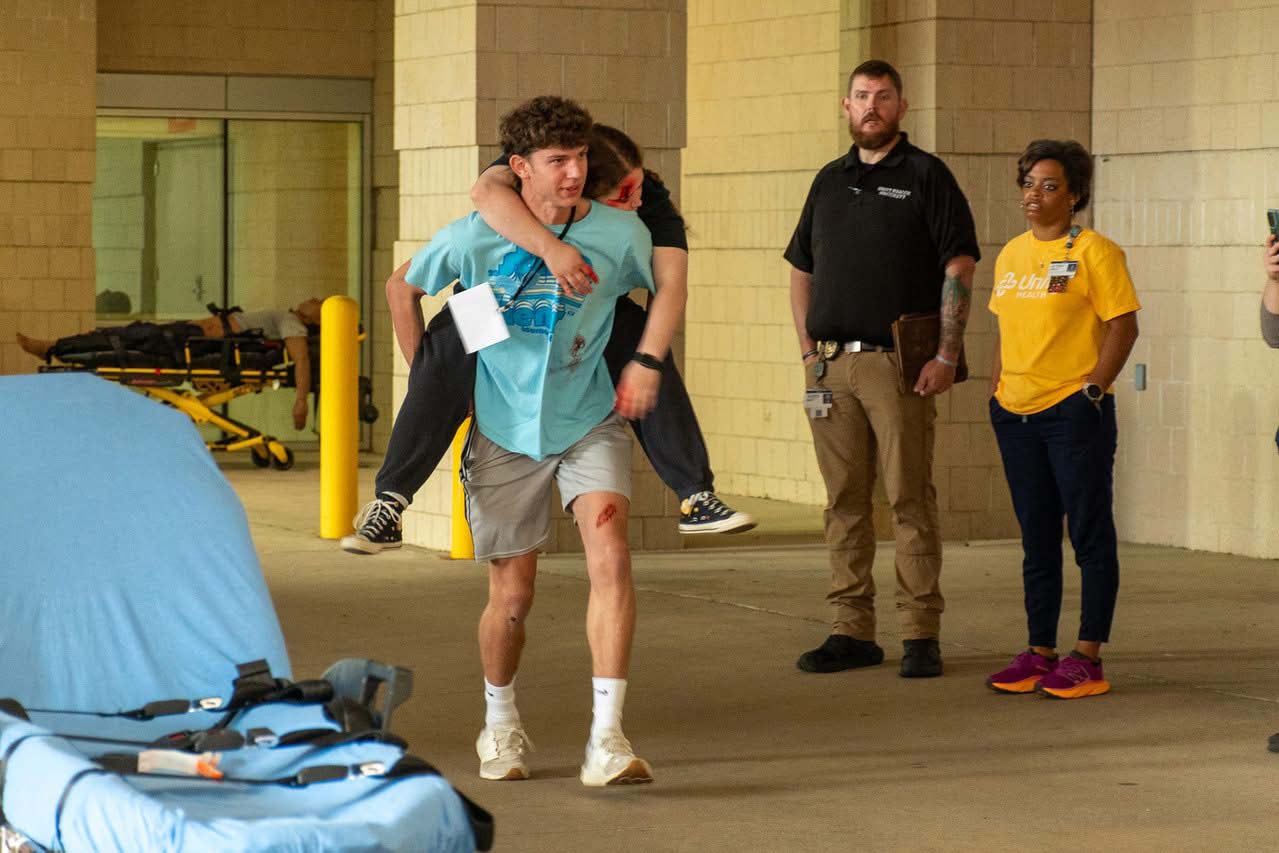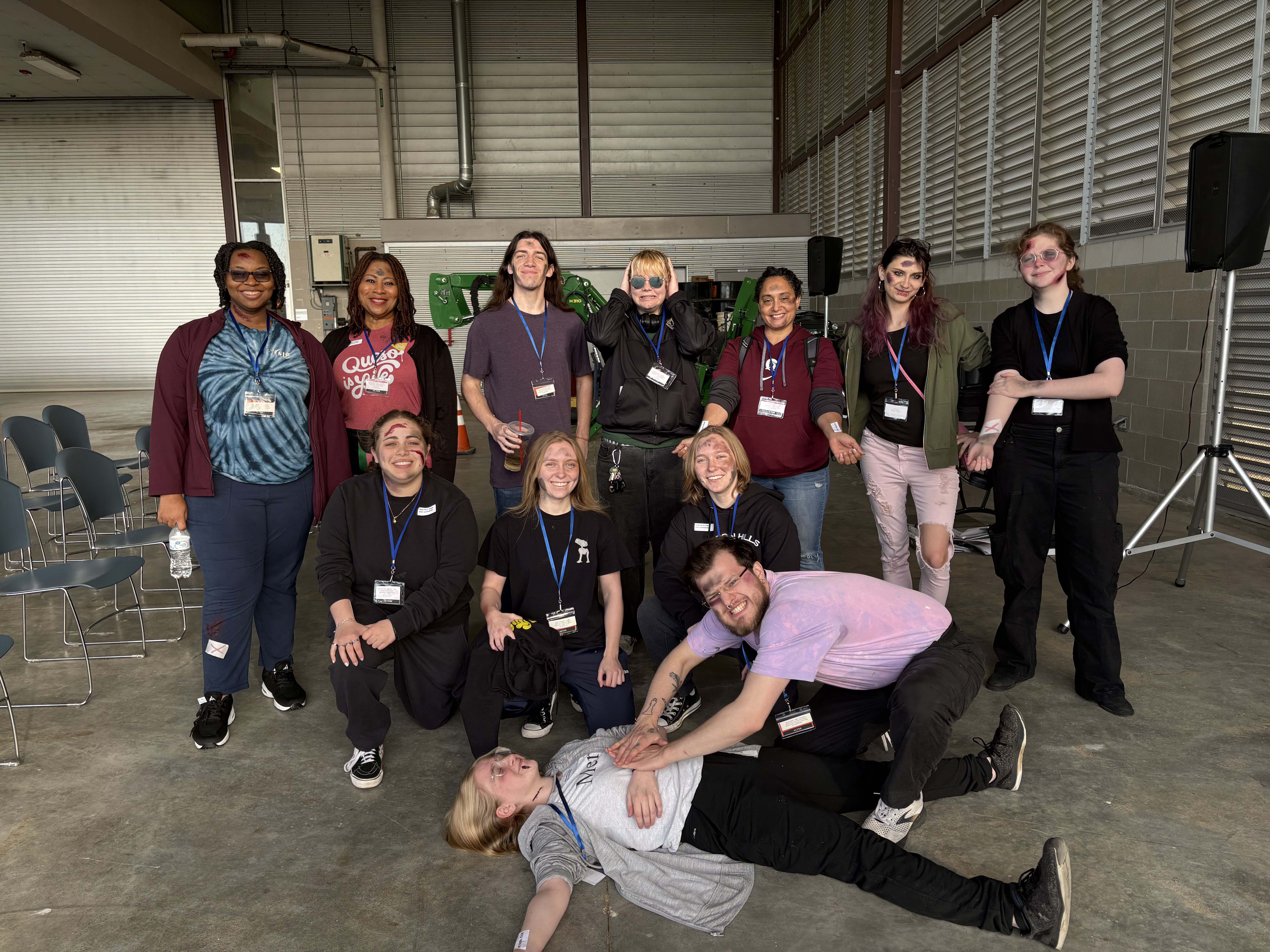UA Little Rock launches hands-on simulation course
July 21-27, 2025
By Sadie Tucker
The School of Literary and Performing Arts at the University of Arkansas at Little Rock is advancing student professionalization and community collaboration through an innovative curriculum focused on simulation-based learning.
The first course emphasizing student professionalization, “Special Topics in Simulation and Therapeutic Uses of the Performing Arts,” was created by Stacy Pendergraft, the producing artistic director of the school.
The spring 2025 pilot course involved students participating as actors in real-world simulated scenarios with on-campus and external partners such as the University of Arkansas for Medical Sciences, the UA Little Rock School of Nursing, the Federal Bureau of Investigation, the Arkansas State Police, the Arkansas Repertory Theatre, the Clinton National Airport, and CHI St. Vincent.
“After planning this course for the past few semesters, it’s been a joy to see it come to fruition and to have such an impact on the city and state,” Pendergraft said. “The course’s success relies on collaboration, and we are grateful to work with such wonderful partners at UA Little Rock and in the local community.”
Among the course’s early projects, the School of Literary and Performing Arts partnered with UA Little Rock’s School of Nursing. As part of a mental health training simulation, students in the special topics course acted as patients in the School of Nursing’s Center for Simulation Innovation.
“My background in theatre has helped me understand how to play a character in order to advance a story,” said Maxx Hodges, a student who took the pilot course. “Knowing how to ‘sit’ in another mindset while still being myself has helped me assist learners in simulation attain their learning objectives, and it has also helped me give valuable communication feedback once the simulation is completed.”
Later in the semester, students participated in a day-long exercise for the Regional Crisis Negotiation Course hosted by the FBI and Arkansas State Police. The simulation involved 22 law enforcement agencies from across the state and gave students the opportunity to portray individuals in high-stakes crisis scenarios and allowed officers to hone their response and communication skills.
“The highlight of my simulation experiences has been the ability to talk about it in depth with peers and professors,” Hodges said. “Acting and giving feedback in simulation can be isolating, so having that community of people who have been in the same experiences builds up my confidence as a standardized participant. Getting to scream at cops and getting applauded by them for it is pretty cool too. I will never forget the sound of a room full of police officers and FBI agents clapping for us.”
The course has also incorporated work in drama therapy and emergency preparedness. In collaboration with the Arkansas Repertory Theatre, Tamra Patterson Calamese, the director of community, learning, and public programs, led a two-week unit on drama therapy that offered insight into the therapeutic aspects of theatre training.
Students also took part in a simulation for the FAA-mandated Triennial Full-Scale Exercise at the Bill and Hillary Clinton National Airport, which focused on enhancing readiness and emergency responsiveness.
“Truthfully rendered simulation portrayal can also elicit emotional reactions and foster a ‘safe place’ for learners to train communication skills in high-stakes circumstances,” said Cooper Sikes, a student who took the pilot course. “It’s been so meaningful to apply my theatre skills in simulation and to actually have an impact on the way responders communicate in high stakes or emergency situations.”
Students concluded their work in the course by providing scenario actors and specialty make-up effects for the CHI St. Vincent Mass Casualty Incident training.
Students joined forces with Metropolitan Emergency Medical Services and CHI St. Vincent Emergency Department healthcare providers in a simulation that gave participants the opportunity to train with Pulsara, a communications and logistics platform critically important in mass casualty emergencies.
“Theatre makers are extremely well equipped to participate in simulations like these because they have specially developed their ability to portray realism and to empathize with their character’s circumstances,” Sikes said.
Along with photographs of the training, Metropolitan Emergency Medical Services (MEMS) published the following post on Facebook: “A huge thank you to the University of Arkansas at Little Rock Theatre Arts students, whose performances as patients and family members brought realism and depth to the scenario. Your participation added an essential layer of authenticity, and your feedback from a patient’s perspective was incredibly helpful… We’re proud to train alongside partners who share our commitment to public safety, innovation, and continuous improvement.”
This meaningful collaboration between the university and these community partners not only provided a valuable training experience for emergency responders, but also highlighted the real-world impact of arts education. The students’ performances extended far beyond the stage, demonstrating how theatrical training can contribute to critical community efforts.
“Watching our students apply their talents in such specialized ways – making a tangible difference in the world and connecting communities – truly exemplifies our school’s core vision to prepare students for impactful careers and to showcase the transformative power of the literary and performing arts,” said Dr. Kris McAbee, the director of the School of Literary and Performing Arts. “I couldn’t be prouder to see how they are applying our curriculum’s development of high-level judgment and communication skills to help shape a safer, more empathetic world.”
With the success of the pilot course, “Special Topics in Simulation and Therapeutic Uses of the Performing Arts,” Pendergraft will partner with the FBI and Arkansas State Police this summer to provide an Advanced Crisis Negotiation course to agencies in Northwest Arkansas.
“Sustaining and building upon the pedagogical success of this past spring’s course is critical,” said Pendergraft. “Along with developing further coursework, my goal moving forward is to cast and financially support an ensemble of student actors who will be deeply trained in all forms of simulation and are at the ready to conduct simulation work throughout the year.”
Through this hands-on approach to curriculum, the School of Literary and Performing Arts continues to offer immersive experiences for its students while strengthening community partnerships across Little Rock.
Photo Cutlines:
1. Jaren Tritt, a simulation participant, carries Emily Rey, a UA Little Rock theatre student, on his back to receive medical treatment during the mass casualty incident simulation held May 6.
2. Jaren Tritt, a simulation participant, carries Emily Rey, a UA Little Rock theatre student, on his back to receive medical treatment during the mass casualty incident simulation held May 6.
Photo Credits:
1. (Photos submitted by UA Little Rock)
2. (Photos submitted by UA Little Rock)




